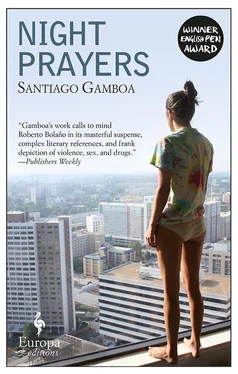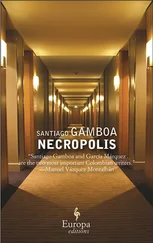That struck me as an excellent omen. I told him that I was grateful, that I had a mandate from the Ministry to hire him as of now. We were convinced of Manrique’s innocence. I suggested trying to find previous cases in which the accused had been the victim of an injustice.
“Don’t worry, Consul,” he said. “I know what you’re thinking, and I’ll tell you something: you’re not on the wrong track in any way. This very day I’ll begin to put together a solid number of cases. In addition, and this too is, let’s say, somewhat privileged information, I know that the police are hot on the heels of a network of amphetamine traffickers from Burma. It may even be that between now and the trial we’ll have some good news.”
I told him I had to go back to Delhi that weekend, but it was only Wednesday. In any event I would be dealing with the case and would be coming frequently.
We signed documents, he gave me his particulars, and, just as I was about to get up, he gently held me back by the arm.
“Go and see the young man,” he said, “it’ll do him good. I’ll make sure they respect him in Bangkwang and don’t mistreat him, but it’s good that you see him regularly. These little things make all the difference. The prison warden is merely a functionary who wants to do well by his country. This kingdom may appear small but it’s big, Consul. The eyes of the king cannot reach into all corners.”
“I’ll go see him tomorrow,” I said. “Today I have to ask the prosecutor for authorization.”
“Don’t worry about that,” the lawyer said. “I’ll make sure that nobody stops you going in. Go tomorrow about ten, I’ll arrange everything.”
We left after reading, sealing, and signing an interminable series of documents that the lawyer would send by courier to the embassy in Delhi just a few minutes later. Then he let me use his telephone and I called Olympia. I asked her to make sure that as soon as the documents arrived they were passed on to Bogotá by diplomatic baggage.
By the time we left, it was almost noon, and we saw a sign on the other side of the avenue: Lobster’s Bar, Wine & Cocktails.
I said to Teresa, “Let me buy you a soda, or whatever you like. It’s just midnight in Colombia and I’m dying for a Bloody Mary.”
But Teresa said, “Oh, yes, Mr. Consul, and what time do you think it is in Mexico?”
We had two Bloody Marys each, to which she added a Singha beer. I looked at her in silence, but she hastened to say:
“Don’t make that face, my rule is not to drink before twelve o’clock, and look, we’re past that. Some people wait until two in the afternoon, but there are times when that’s simply not realistic. Right, I’m off to the embassy, let’s talk later. Call me.”
She got in a taxi and disappeared into the traffic.
I hailed another and went back to Suan Plu Soi 6, Sathorn Road. I had the impression, or rather the intuition, that the Regency Inn Hotel still had something to tell me. Again I walked around before making up my mind to enter; if someone saw me, I thought, they might alert the true criminals (“but this isn’t going to be a crime story”).
This time, the young man I had seen before wasn’t at the reception desk. Instead, there was a woman my age, so I asked her if I could see room 301, which was still free. She handed over the keys. As I went in, I saw myself reflected in the closet mirror. I sat for a while on the bed, without thinking of anything specific. There was nothing new, only the dense air. This was all so unfair. Something dark seemed to be making its way through the air, without seeing reason, without listening to the words of a young man who had already known, before arriving here, what it was to suffer and be very alone.
I went back to my hotel and locked myself in my room. I wanted to read, to think, even to forget. To prepare myself for the following encounter. The next day I would go early to Bangkwang.
The time had come to start listening to him.
13. INTER-NETA’S MONOLOGUES
On days like these, dear internauts, I feel the need to do something intimate, to expose another small corner of my mind to your eyes. I’m going to talk to you about the liquid of purity and madness. The most important creation of the soul in alcoholic terms. Can anyone guess? You’re not even warm. Because it’s a drink that’s served very cold.
Like so many things in the world and in life, gin was invented in the seventeenth century (some say 1550, who is right?) by a distinguished member of the medical profession, the Dutchman Franciscus Sylvius de le Boë, and as he was a physician its original use — as you can imagine — was very different than the one we give it today: it was a diuretic. It helped us take a leak. De le Boë’s ambitious idea was to relieve constipation and stomachaches according to some, gallstones and liver complaints according to others, with a mixture of distilled barley, rye, and corn, and in order to increase its potency he added berries of juniper (French: genièvre ; Dutch: genever ) to the brew.
Did Shakespeare drink it? If De le Boë did indeed invent it in 1550, then old Will would have been in time. It’s highly unlikely that he never suffered from constipation or needed to provoke urination.
John Cheever wrote: “A lonely man is a lonesome thing, a stone, a bone, a stick, a receptacle for Gilbey’s gin, a stooped figure sitting at the edge of a hotel bed, heaving copious sighs like the autumn wind.”
When the recipe crossed the English Channel and reached the British Isles, at the time of William of Orange — who was Dutch, like Rembrandt and van Gogh and Rip Van Winkle and Heineken beer — the legend was born that the name genever came from Guinevere, the wife of King Arthur of the Round Table, an intelligent woman generous with her private parts, who cuckolded the king with Lancelot of the Lake. (I would have done the same, with a name like that!)
By the way, do you know why the Swiss don’t drink whiskey?
Because they have a lake of gin (Lake Geneva, get it?).
Before then, the English used to get plastered — what a crude word that is, how much more refined is se soûlaient la gueule— on pear liqueurs and French wines, but the closing of trade with France led to authorization being given for the distilling of grains native to the British Isles. When it comes to binges and benders, you have to be independent.
Gin was a “smash hit.” Two and a half million gallons in 1690, five million in 1727, and twenty-one million ten years later. With a population of six and a half million, that makes, let’s see, three and a half gallons a head per year! Not bad. Alarmed, in 1736 Parliament passed the Gin Act, levying high taxes on sales, thus restoring order and saying: “We’re Protestants! We have to defer gratification!”
The English say, with their English sense of humor: “There’s always someone trying to stop us from getting drunk,” but the producers continued bottling the stuff secretly and consumption increased. Bernard Shaw would say much later: “Alcohol is the anesthesia by which we endure the operation of life.”
In 1742, there were twelve thousand arrests. Faced with this landslide of prisoners — drunks sleeping it off in prison cells — Parliament lowered the taxes. Life is short and drink is long and plentiful. The producers went back to making legal gin, of excellent quality. The first to have a registered name, in 1749, was Booth’s, the oldest distillery in England.
As Frank Sinatra says: “Alcohol may be man’s worst enemy, but the Bible says love your enemy.”
It was normal to drink it without ice. Sometimes with a little sugar. Lord Byron said that gin and water was the origin of his inspiration. In a grim period it was recognized as the drink (not bitter but sweet) of the lower classes. Charles Dickens, being a puritan, denounced the “gin palaces.” Prime Minister Gladstone tried to limit its sale to certain bars and lost his seat. “I was buried under a torrent of gin,” he said.
Читать дальше












